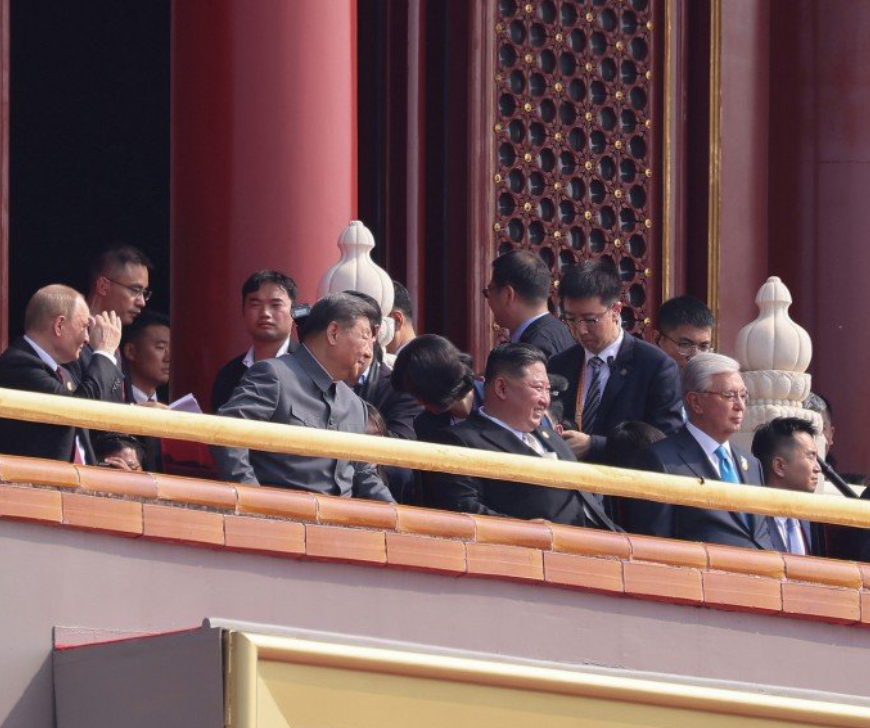The role of Central Asia in Tianjin's “new order”
Of the five countries, only Turkmenistan is not a member of the Shanghai Cooperation Organisation (SCO), in keeping with its traditional international neutrality, but President Serdar Berdymukhamedov was nevertheless present at the parade in Beijing. Trade between the region and China grew by 5% last year and will soon exceed 0 billion. Russia is now forced to play a secondary role.
Astana (AsiaNews) - The military parade in Beijing on 3 September showed the world the power of the new ‘Mao Zedong-Xi Jinping’ China, surrounded by the leaders of 20 countries, after the Shanghai Cooperation Organisation summit that conveyed the idea of a new world order dominated by Beijing against the enemies of the West.
The presidents of Central Asia could not miss the call, by virtue of their political, diplomatic and economic agreements with the Chinese.
Kazakh political scientist Dosym Satpaev commented on the grand event in Azattyk Asia. The leaders of Central Asia enthusiastically support Xi Jinping's line of ‘peaceful neutrality’, as evidenced by articles published in China Daily by the presidents of Kazakhstan and Uzbekistan on the eve of the summit, representing the two main economies of the ‘middle region’.
According to Kazakhstan's Kasym-Žomart Tokaev, “the impressive development of today's China, under the enlightened leadership of its president with global vision, brings significant benefits to all, opening up great prospects for all its neighbours”. His Uzbek colleague Shavkat Mirziyoyev describes Xi Jinping as “a dear friend” and his political course as “consistent and forward-looking”.
The president of Tashkent believes that the SCO ‘is not a challenge to other existing structures in the world, but a response to the needs of a new, more just world order based not on force but on dialogue’.
Of the five countries, only Turkmenistan is not a member of the SCO, in accordance with its traditional international neutrality, but President Serdar Berdymukhamedov has assured that he considers the Shanghai organisation to be ‘worthy of great respect’ and very important and constructive in continental and global processes, honouring the Chinese with his presence at the grand parade.
Satpaev comments that China's intention was precisely to ‘show itself as a powerful political-military, economic and innovative centre, around which all neighbours and partners must increasingly unite’.
Central Asia's role in this context is very important, considering that the SCO was founded as a five-member group comprising Kazakhstan, Uzbekistan, Tajikistan, Kyrgyzstan and China, prioritising security concerns and then economic agreements, which are now its main focus. The trade balance between China and Central Asia reached billion in 2024, 5% more than the previous year, and is expected to exceed 0 billion this year.
China is the main investor in the extraction of natural resources in the region, increasingly developing transport routes to Europe as part of its ambitious One Belt & One Road programme. Construction has already begun on the railway line from Kyrgyzstan to Uzbekistan, which, together with the routes through Kazakhstan and Turkmenistan, connects China to the Caspian Sea and opens the door to Chinese exports to Europe via the “Middle Corridor”.
China is fundamental to the region as a source of raw materials, both traditional ones and new rare and critical minerals for the contemporary economy. Russia, which has always considered Central Asia its “backyard”, is forced to play a secondary role to China in the region, as confirmed by the documents from the Tianjin summit, which avoided any mention of Ukraine or situations directly related to Putin's Russia.
According to Satpaev and many other commentators, the most obvious summary of Russian policy in recent years is that “Russia, by rejecting the West, has opened China's doors to the West and the rest of the world, via Central Asia”.
24/05/2012







.png)










